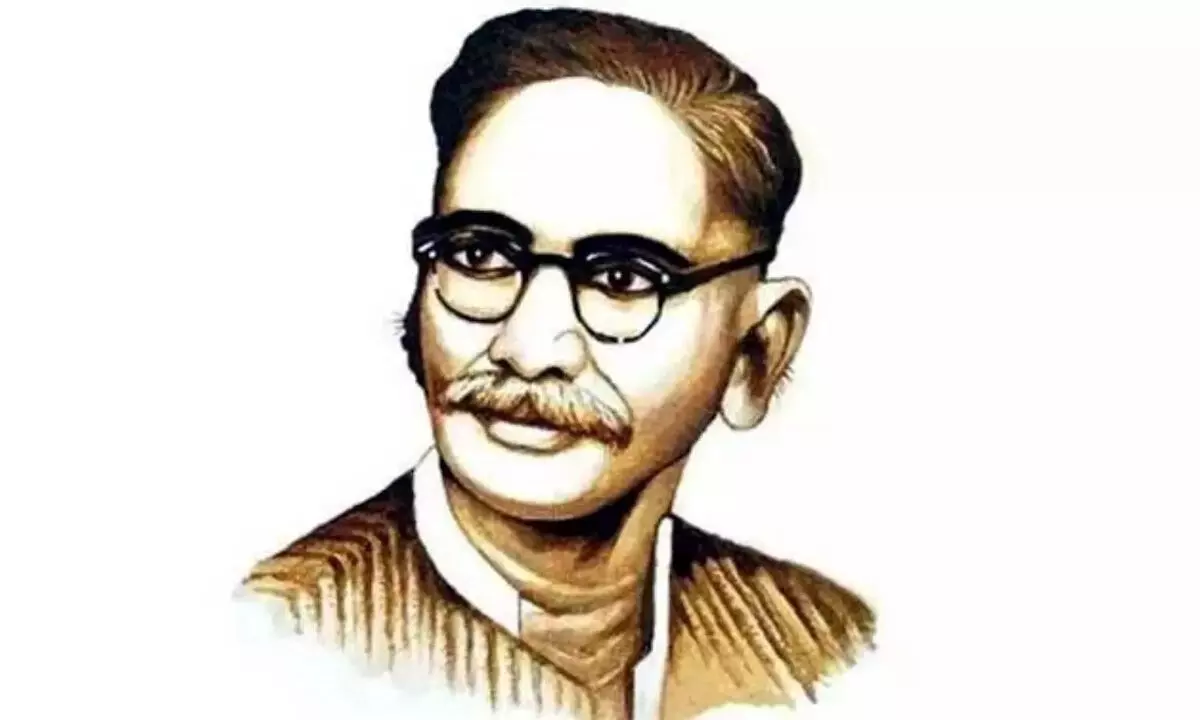Jashuva: Poet, Revolutionary and Thinker

This September 28th, we will be celebrating 129thbirth anniversaryof the noted Telugu poet Gurram Jashuva. Gurram Jashuva was born in Vinukonda in the erstwhile Guntur district and the present Palandu district on 28th September 1895.
This September 28th, we will be celebrating 129thbirth anniversaryof the noted Telugu poet Gurram Jashuva. Gurram Jashuva was born in Vinukonda in the erstwhile Guntur district and the present Palandu district on 28th September 1895. Jashuva’s parents themselves had gone for inter-caste marriage in those days itself; his father Veeraiah hailed from Yadav community while his mother Lingamma came from Madiga community. Jashuva had to face discrimination on two fronts – one due to poverty, and, two, due to his caste status.
Jashuva and his brother were brought up as Christians by their parents. The discrimination against Jashuva was strong and deep in those days, which made him remark in his later life, “I have two teachers – poverty and caste discrimination. One taught me patience, while the other taught me courage to rebel.” In 1910 at the age of 15 years, he got married to Mariamma and later joined in a missionary school for Rs 3 of monthly salary.
His thirst for education made him secure a diploma of Ubhaya Bhasha Praveena and gained expertise in Telugu and Sanskrit languages in his life. Later, he moved to Rajamahendravaram and worked as a voice artiste for movies between 1915 and 1916. In those days, there were only silent movies and voice artistes would sit and explain story and deliver dialogues concomitantly in tune with the movie story. Followed by this, he shifted to Guntur and nearly taught for 10 years at the teacher training centre started by Lutheran Church in Guntur. Between 1928 and 1942, he worked as a Telugu Pandit at a high school in Guntur. The British government undertook war campaign in India and Gurram Jashuva worked as a campaigner in the National War Campaign for the Second World War from 1942 to 45.
Jashuva also worked a producer at the Madras radio station for a couple of years between 1957 and 1959. In 1964, he was nominated to the Andhra Pradesh Legislative Council (APLC) as a Member. Jashuva received several awards and notable among them were Sahitya Akademi in 1964 for his work titled ‘Kreesthu Charitra’ and later in 1970 he was felicitated with Padma Bhushan by the Government of India. One year later in 1971 at the age of 75 years, Jashuva passed away. Throughout his lifetime, Jashuva fought against superstitions and discrimination. He had to face discrimination from Hindu caste people for being an ‘untouchable’, while from Christian priests he faced discrimination for writing on Hindu mythology stories. As a result, Jashuva slowly moved towards rationalism. He married his third daughter, Heamalatha, raised as a Christian, to Lavanam, the son of Goparaju Ramachandra Rao, popularly known as GoRa, and atheist Bramhin. Hemalatha and Lavanam were married in Gandhi’s ashram in 1960 at Sevagram.
Jashuva is widely known for his sense of humour particularly among the Telugu audience. Much of his satiric statements contain humour as well as in-depth reality. Several of these satires often lose their flavour when translated from Telugu to other languages. He lived his life as an example, never losing sight of self-respect. Though, many scholars chiefly talk about his works, ‘Gabbilam’ and ‘Firadousi’, there are other works, too, to his credit.
Jashuva is a poet, revolutionary and, more importantly, a thinker. Oppressed people and the discrimination against them coupled with injustices meted out to them formed the core of his philosophy. He was the first one to write about the oppressed sections in Telugu literature. In a way, he paved the for Dalit assertion by venting out against the discrimination. Thus, Jashuva belongs to the humanity in general and the oppressed people in particular. That way, Gurram Jashuva is truly an internationalist in the right spirit of the word.








